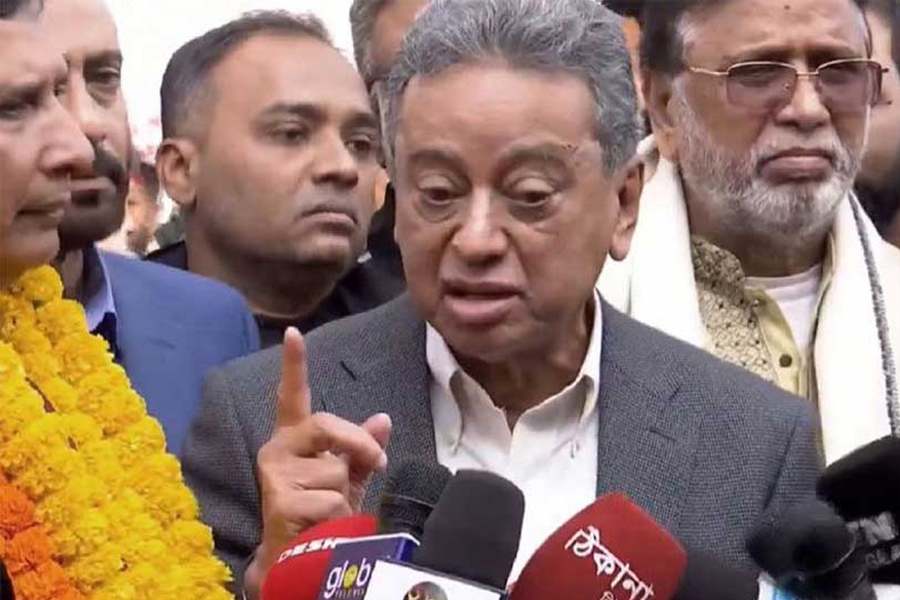

BNP Standing Committee Member Amir Khosru Mahmud Chowdhury has dismissed calls for the so-called "Minus Two" formula and defended his party's resilience, asserting that it remains a dominant political force in Bangladesh.
Speaking to journalists on Friday after paying tribute at the grave of BNP founder and former president Ziaur Rahman in Dhaka's Sher-e-Bangla Nagar, Khosru criticised efforts to depoliticise the country and sideline its top leaders, bdnews24.com reports.
“The popular BNP cannot be wiped out with fabricated theories of depoliticisation,” Khosru said.
“If someone is making fabricated statements about depoliticisation or Minus Two, then it is their problem. BNP stands where Bangladesh does today. The most popular party is the BNP, the most popular leaders [are Khaleda Zia and Tarique Rahman].”
"Bangladesh is waiting for them, and will keep doing so. Those who speak of minus-two are only hoping for it. Their hopes will never come true.”
“[Hussain Muhammad Ershad] couldn’t do it. 1/11 couldn’t do it. And today, the BNP is stronger than ever. It cannot be wiped out.”
After a caretaker government assumed power on Jan 11, 2007, several prominent political leaders, including Khaleda, her son Tarique, and Sheikh Hasina, the leader of the Awami League, were detained.
The period was marked by heightened discussions of political reform, with proposals emerging to reshape the nation’s political landscape.
Central to these discussions was the so-called "Minus Two" formula, a contentious proposal aimed at sidelining the two leaders to pave the way for broader reforms within their parties.
Decades later, similar conversations resurfaced following the ouster of the Awami League government during the student-led uprising unrest of July and August 2024.
Calls for reform gained traction as opposition groups, including the BNP, demanded sweeping changes to the state’s governance framework. Among their key demands was the establishment of a roadmap for national elections, contingent on implementing structural reforms across various sectors.
Khosru said, "Democracy must be established in Bangladesh. The first task for that is elections. Elections are the first reform. The movement for reforms and restoration of democracy must begin with this.”
"The change that is expected in the coming days will be fulfilled through the democratic process."
For more than a decade and a half, many leaders and activists affiliated with the US chapter of the BNP and its allied organisations have faced significant barriers to returning to Bangladesh, largely attributed to the policies of the deposed Awami League government.
While some have managed to make their way back in recent times, many others are still unable to return.
Khosru also praised the efforts of expatriate party leaders and activists, who, for the past 16 years, have been at the forefront of anti-fascist and anti-dictatorship movements in Bangladesh.
Operating from various parts of the United States, these individuals staged protests in prominent locations, including outside the White House, Capitol Hill, and the World Bank, denouncing what they described as Hasina’s authoritarian rule in Bangladesh.
“These individuals have faced lawsuits, their relatives have been targeted, and they have endured significant persecution,” the leader stated.
“Many of their families have suffered unimaginable losses—lives taken, children and grandchildren lost. We extend our heartfelt gratitude to them.”
Khosru emphasised that the recent political upheaval of July and August did not emerge overnight, pointing to the sacrifices made over the past 16 years.
“It’s easy to forget the thousands of people who have given so much for this movement,” he said.
“These individuals, who have been unable to return to their homeland for 16 years, were integral to sustaining the struggle. Without them, there would have been no movement.”


 For all latest news, follow The Financial Express Google News channel.
For all latest news, follow The Financial Express Google News channel.